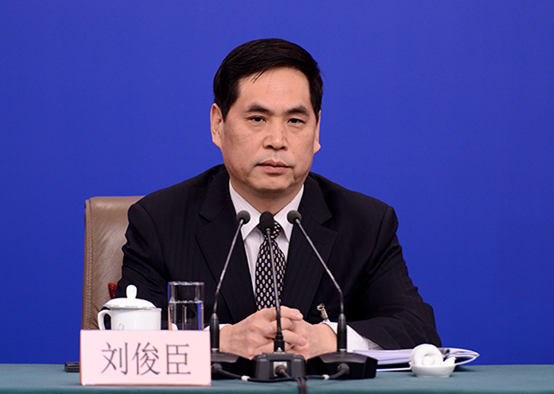

The rollout of a new foreign investment law will definitely uplift China’s opening up to a new high, a senior legislator said on March 9, as the latest draft of the proposed law has been submitted to the nation's lawmakers for deliberation.

Liu Junchen, vice chairman of Legislative Affairs Commission of the National People's Congress (NPC) Standing Committee, attends a press conference on the legislative work of the NPC for the second session of the 13th NPC in Beijing, capital of China, March 9, 2019. (Photo: People’s Daily Online)
The updated one will give full bring to the role of law in consolidating foundations, stabilizing expectations and bringing long-term benefits, Liu Junchen, vice chairman of Legislative Affairs Commission of the National People's Congress (NPC) Standing Committee, told a press conference on the sidelines of the annual legislative session.
The review on the new foreign investment law by China's top legislature is of great and far-reaching importance, as it signifies China’s determination and resolution to push ahead with the reforms and opening up, Liu said, adding that the rule of law serves as the best guarantee to business investment.
If adopted, the new law will replace three existing laws on Chinese-foreign equity joint ventures, non-equity joint ventures and wholly foreign-owned enterprises to serve as China’s basic law on foreign investment.
The legislator explained that the three laws, which were formulated in the early days after China launched its reform and opening up policy, have provided important legal guarantee for investment inflow, but they could hardly catch up with the changing requirements brought by new updates.
To meet the demands to build an open economy in the new era, it is imperative to enact a new unified basic law on foreign investment, Liu further explained.
The decision, according to the deputy, is also an unescapable choice for further opening up, building a new foreign capital management system, and unifying regulations on domestic and foreign investments.
Defined as a basic law on foreign investment, it prioritizes in making clear the basic framework, rules and norms of the new legal system for foreign investment, and also clarifying the framework guideline of the system to manage those investment, said Liu.
If the law is adopted, supporting rules and regulations will be formulated to ensure an open, transparent and predictable environment for law-based management, he added.
The draft makes it clear that the state shall manage foreign investment according to the system of pre-establishment national treatment plus a negative list, which means that foreign investors and their investment will be subject to a national treatment during the entry stage rather than after their accession.
Such an adjustment represents a high-level facilitation and liberalization for investment, Liu elaborated.
With an aim to facilitate and protect foreign investment, the new law sets its key tune as expanding opening up and promoting foreign investment inflow, Liu said, adding that the draft also addresses the detailed agendas concerned by foreign investors.
 Fire brigade in Shanghai holds group wedding
Fire brigade in Shanghai holds group wedding Tourists enjoy ice sculptures in Datan Town, north China
Tourists enjoy ice sculptures in Datan Town, north China Sunset scenery of Dayan Pagoda in Xi'an
Sunset scenery of Dayan Pagoda in Xi'an Tourists have fun at scenic spot in Nanlong Town, NW China
Tourists have fun at scenic spot in Nanlong Town, NW China Harbin attracts tourists by making best use of ice in winter
Harbin attracts tourists by making best use of ice in winter In pics: FIS Alpine Ski Women's World Cup Slalom
In pics: FIS Alpine Ski Women's World Cup Slalom Black-necked cranes rest at reservoir in Lhunzhub County, Lhasa
Black-necked cranes rest at reservoir in Lhunzhub County, Lhasa China's FAST telescope will be available to foreign scientists in April
China's FAST telescope will be available to foreign scientists in April "She power" plays indispensable role in poverty alleviation
"She power" plays indispensable role in poverty alleviation Top 10 world news events of People's Daily in 2020
Top 10 world news events of People's Daily in 2020 Top 10 China news events of People's Daily in 2020
Top 10 China news events of People's Daily in 2020 Top 10 media buzzwords of 2020
Top 10 media buzzwords of 2020 Year-ender:10 major tourism stories of 2020
Year-ender:10 major tourism stories of 2020 No interference in Venezuelan issues
No interference in Venezuelan issues
 Biz prepares for trade spat
Biz prepares for trade spat
 Broadcasting Continent
Broadcasting Continent Australia wins Chinese CEOs as US loses
Australia wins Chinese CEOs as US loses